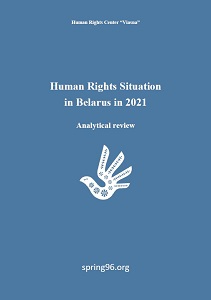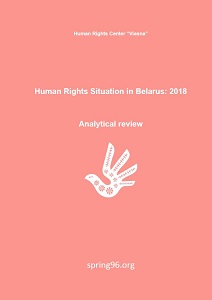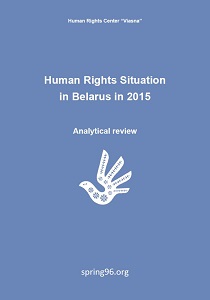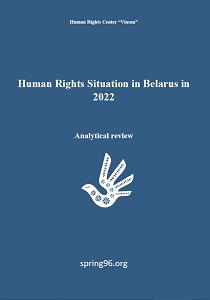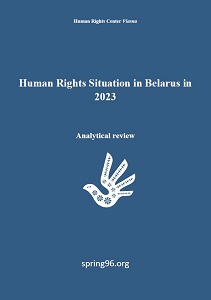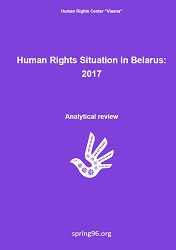
We kindly inform you that, as long as the subject affiliation of our 300.000+ articles is in progress, you might get unsufficient or no results on your third level or second level search. In this case, please broaden your search criteria.

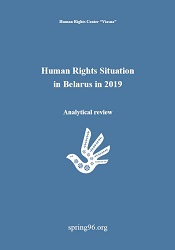
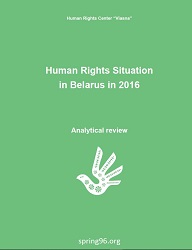
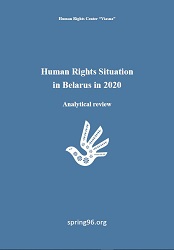
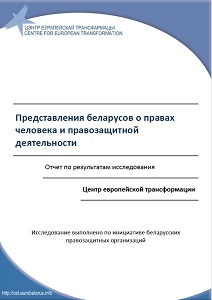
In accordance with the terms of reference, the purpose of the study was to reveal the ideas that exist in Belarusian society about the relationship between a person and the state, human rights and human rights activities. As a research method, the method of focus group interviews was chosen, which allows to reveal not only people's points of view and opinions, but also the basis on which they are built. The main hypothesis was that the views and attitudes of Belarusians on issues of interest to us differ depending on the relationship of their social group to the state system. Based on this, four social groups were selected from which participants were recruited for conducting focus groups.
More...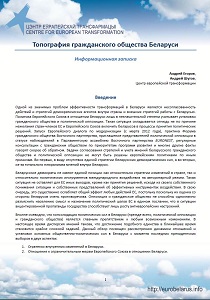
One of the significant problems of the effectiveness of transformations in Belarus is the inconsistency of actions and strategies of democratic agents inside the country and external strategies of work with Belarus. The policy of the European Union in relation to Belarus takes into account the views of civil society and the political opposition only to a small extent. This situation is not due to the reluctance of EU and European Union member states to include Belarusians in the process of making political decisions. The launch of the European Dialogue on Modernization (since March 2012), the practice of the Civil Society Forum of the Eastern Partnership, the invitation of representatives of the political opposition in the status of observers to the Parliamentary Assembly of the Eastern Partnership EURONEST, regular consultations with civil society on the priorities of development programs and many other facts speak rather to the contrary . The tasks of coordinating strategies and taking into account the opinions of Belarusian civil society and the political opposition cannot be solved by European politicians for other reasons. Firstly, due to the lack of a unified strategy of the Belarusian democratic forces, and secondly, due to the total pluralism of opinions within Belarus.
More...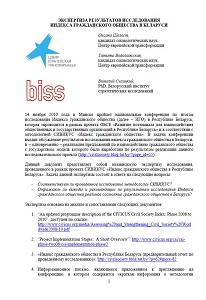
This document is an independent examination of research conducted within the CIVICUS project "Civil Society Index in the Republic of Belarus". The task of this examination is to answer the following questions: - Does the conducted research correspond to CIVIKUS methodology? - Do the conclusions and recommendations based on the results of the Civil Society Index study reflect the real state of civil society in Belarus?
More...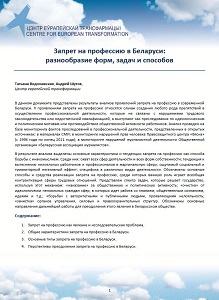
This document presents the results of the analysis of the manifestations of the ban on the profession in modern Belarus. Manifestations of the ban on the profession include cases of creating any kind of obstacles in the implementation of professional activities, which are not related to violations of labor legislation or insufficient qualifications, but act as persecution for ideological and political motives or opposition to the social activity of employees. The analysis was carried out on the basis of monitoring facts of persecution in professional activities, presented in open sources: in media materials; in the monitoring of human rights violations of the Viasna Human Rights Center (from 1998 to the end of 2011); in the monitoring of violations of journalistic activity by the Public Organization "Belarusian Association of Journalists".
More...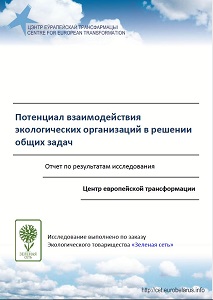
Belarusian ecologically oriented organizations (hereinafter referred to as "green", ecologists) occupy a significant place in the structure of the public sector of Belarus. This is expressed both in the total number of active organizations and in the visibility of their actions against the general background of the activity of public organizations. In recent years (2010-2013), about 30 joint actions and campaigns of ecologists took place, which were actively covered by mass media and released a certain public resonance.
More...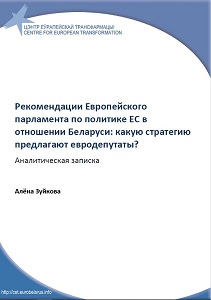
The European Parliament, on the initiative of the Lithuanian deputy from the faction of social democrats Eustas Paletskis, developed policy recommendations for European institutions regarding Belarus (the document was adopted on September 12, 2013). This is an important step in the development of European policy towards Belarus for two reasons: first, because the European Parliament has not yet played an active role in European-Belarusian relations; secondly, because European-Belarusian relations are characterized by the absence of a specific strategy in the EU.
More...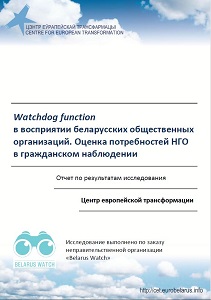
Among the functions of public organizations (NGOs), civil control (watchdog function) occupies one of the central places. This function presupposes the protection of society from manifestations of ineffectiveness of public and private institutions, illegal practices, violations of basic human rights, etc. In the implementation aspect, civil supervision involves monitoring, detection of facts of violations, publication of facts, direct actions to prevent violations and protect against violations. In the practice of activities of public organizations, this function often exists in an inextricable connection with the functions of advocacy, protection of human rights, and protection of the interests of target groups, and therefore may not be perceived as something separate. In addition, the implementation of civil control often requires special knowledge, skills and qualifications that are not always present in the NGO environment.
More...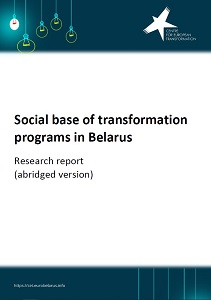
The necessary condition of democratic transformations in Belarus is the formation of a strong civil society that should fulfill three main functions: 1) to act as a full-fledged party of the dialogue aimed at defining the country development agenda; 2) to produce the environment of appearing and implementing innovations in the country’s economic, technological, and socio-cultural development; and 3) to mobilize the intellectual and human potential so as to implement transformations. In order to fulfill these functions, it is necessary: 1) to have self-determined subjects in the field of Belarusan civil society, which have their own program proposals and vision of necessary changes across the nation or in a concrete sphere; 2) to have a social base of support and distribution of these tenets and implementation of programs.
More...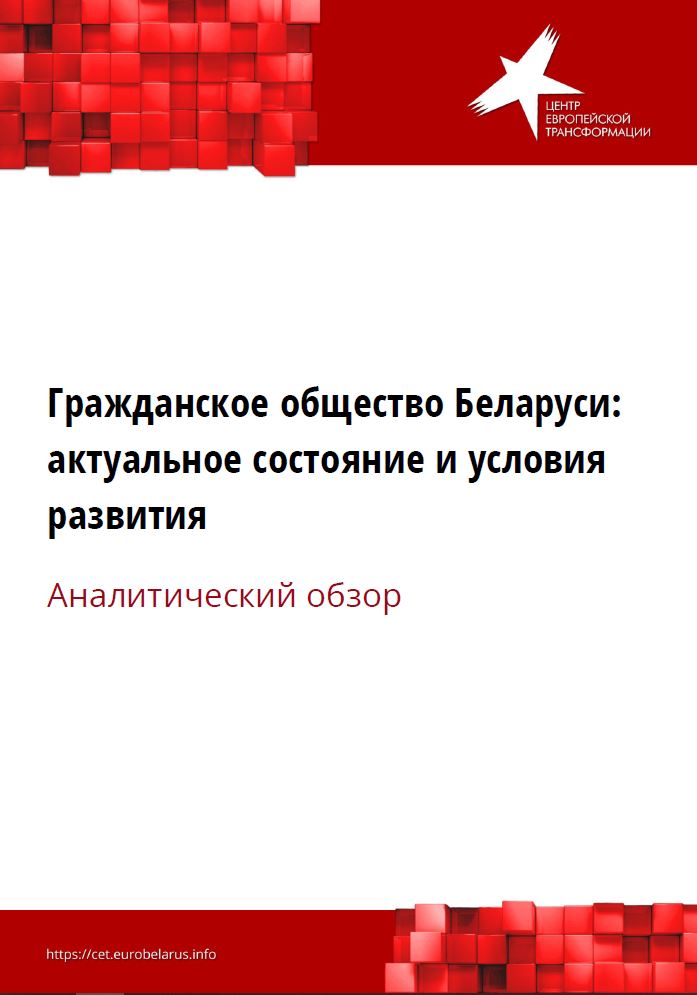
Analysis of the current state of civil society in Belarus faces a number of methodological difficulties associated with gaps in official statistical data, a small number of special studies, as well as restrictions on freedom of association in Belarus, when a significant part of public activity is in the shadows for various reasons. In this analytical review, we will summarize the data of several of our own sociological and sectoral studies of 2014-2017, drawing on official statistical data and the results of some recent special studies. We will touch on the issues of statistics of civil society organizations, their spheres of activity, geographical distribution, participation of the population in the activities of the "third sector", the popularity of public organizations, as well as some political, legal and financial conditions of their activity.
More...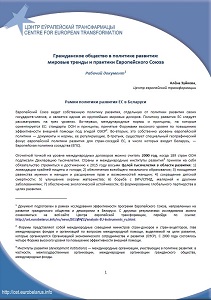
The European Union conducts its own development policy, separate from the development policy of its member states, and is one of the world's largest donors. EU development policy should be considered on three levels. First, the international norms and principles on which the EU is oriented: UN standards and principles adopted by the High-level Forums on improving the effectiveness of foreign aid under the auspices of the OECD2. Secondly, this is the actual level of European politics — the documents and norms that regulate it. Thirdly, there is a special geographical focus of the European development policy for the neighboring countries of the EU, which includes Belarus - the European Neighborhood Policy (ENP).
More...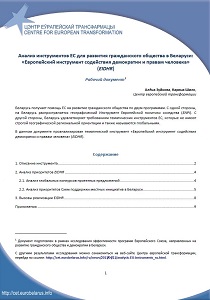
The "European Instrument for the Promotion of Democracy and Human Rights" (hereinafter - EIDHR) was created in 2007 and replaced the "European Initiative for the Promotion of Democracy and Human Rights"2. The instrument was created to promote the development and consolidation of democracy and the rule of law, respect for all human rights and freedoms. EIDHR is consistent with the EU's foreign policy as a whole, acting within the framework of the EU's development policy and economic, financial, technical cooperation with third countries. The EIDHR strategy is based on working with and for civil society organizations and is aimed at protecting fundamental freedoms, it also promotes civil society to become an effective force for political reforms and protection of human rights. Thus, this program will complement geographic tools that promote democracy and human rights, primarily through cooperation with the government.
More...